17
September 2001
![]()
2. "Cyprus beyond the logic", the first thing I did upon my arrival in Cyprus was to fall asleep on the Prime Minister.
3. "The long denied Armenian Genocide", Turkey's carefully forgotten history.
4. "Turkey Nervously Awaits US Response", Turkey's army stood at alert as NATO's only Muslim member worried that U.S. military retaliation for this week's terrorist attacks could target its neighbors and place further strain on its threadbare economy.
5. "United Nations should organize a peace conference", denouncing the attacks in USA on behalf of 32 non-governmental organizations, Diyarbakir Democracy Platform called on the United Nations (UN) to organize a "Peace Conference" in order to eliminate violence.
6. "Istanbul police clash with hunger strike supporters", police used tear gas and water cannon in clashes with supporters of jail hunger strikers in Istanbul on Saturday, human rights activists and witnesses told AFP.
1. - AFP - "Thirty-fourth death in Turkish prison hunger strikes":
ISTANBUL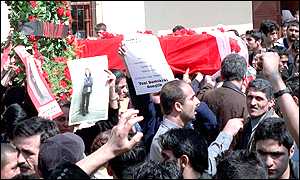
A woman activist on Friday became the 34th person to die in a long
series of hunger strikes held to protest a change in jail conditions
for political prisoners in Turkey, the victim's family said.
Umus Sahingoz, 32, died after 330 days without taking food in a house in Istanbul's Kucukarmutlu neighbourhood. Sahingoz began her hunger strike in prison, where she had been serving a sentence since 1997 for her membership of the underground Revolutionary Party-Front for People's Liberation (DHKP-C).
She had later been taken to hospital, and then allowed to go to the house, where several protestors and prisoners are fasting, as her condition deteriorated. The hunger-strike movement was launched last October by far-left prisoners, who are protesting against a decision to move them to new establishments equipped with individual cells rather than the collective ones they previously shared. The prisoners say the new prisons will prevent them from remaining in contact with one another, and make it more easy for the guards to mistreat them.
At the end of December last year the authorities launched
assaults on some 20 prisons where inmates were protesting the new arrangements.
Thirty prisoners and two members of the security forces were killed
in the assaults. ![]()
2. - Philipine Daily Enquire - "Cyprus beyond the logic":
THE FIRST thing I did upon my arrival in Cyprus was to
fall asleep on the Prime Minister. Not literally, thank goodness, although
his paunch would have made for a good pillow. At that moment, having
stepped off a 26-hour air journey into 40-degree heat, anything would
have made a good pillow. As it turned out, the pillow was superfluous.
The press conference was held in one of the official Ministry state
rooms with Second Empire furniture; the chairs were arranged in a U-shape,
and the chair at the center of the U having more gold-leafing and more
luxurious fringes than the others was assumedly where the Prime Minister
sat. Photographers, television cameras and transcribers were at the
open end of the U, with every lens pointed in my general direction of
the throne. For some reason, I found myself seated in the chair beside
him, directly in the line of vision of all the lenses. The press conference
began presently. What seemed like seconds later, the room was empty,
and I was being shaken awake by a Ministry official, who sternly pointed
out that my drooling somnambulance would be broadcast live across Turkey
that evening on the news. It was not an auspicious beginning.
I was in the TRNC, the Turkish Republic of Northern Cyprus,
a country that politically does not exist. It is acknowledged as a nation
only by one other country, Turkey, which aside from re-affirming its
otherwise Cartesian existence, supports them financially, and during
the summer months, kindly sends over fresh water from the mainland by
means of balloons (I never got around to asking exactly how, and the
mystery has haunted me ever since). They use the Turkish lira as currency,
and on many buildings, they fly the Turkish flag as well as their own.
Yet it has its own president, a separate government and is applying
for entry to the EU as an independent nation. 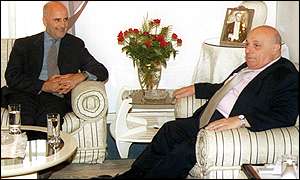
Cyprus has held a fascination for me, especially the northern coast
and the mountain town of Bellapais, because this is where my favorite
novelist Lawrence Durrell lived, and which he immortalized in his most
complex, some say his best, memoir, "Bitter Lemons." Durrell
wrote it when the political problems, which were to divide the island,
were just beginning, and the air of the autobiographical reminiscence
(one hesitates to call it a travel book because he didn't really move
about that much) is an odd admixture of idyllic idleness and pastoral
sensuality tainted with the darkening political atmosphere. The Greek
Cypriots were demanding Enosis, or union with Greece; the Turks who
lived on the island objected. The violence that ensued was finally cut
short when Turkey sent its armies in and took over the northern half
of the island. The rest of the world called it an invasion; the Turkish
government called it an intervention. Today, Cyprus is divided into
two on a horizontal axis called the Green Line, which is patrolled by
the UN; the line runs through the capital, Nicosia, making it the last
divided capital in the world.
I knew very little about world politics, and all this began to fall into place only as we were arriving at our destination. The flight took us to Singapore, Dubai, and then Istanbul, where we "entered" Turkey and then took an "international" flight to Ercan, a place which, alarmingly enough, I did not find on my Lonely Planet map of the island. It is always rather unnerving to be flying to a place that did not exist: would there even be a landing strip? Cartographers have mapped the valleys of the moon, but not, apparently, a destination with an international airport. Even more worrisome was the fact that the tiny plane did not have a loo on board, and I hoped that the non-existent city in the non-existent country that we were flying to would have not just existent, but sanitary, toilets at the airport.
Ercan (pronounced "Er-jan") was in fact the
name of the airport, a small cluster of buildings in the middle of nowhere.
I used the toilet, had a cup of Turkish coffee, and then was whisked
off with a group of fellow journalists, who had received similarly cryptic
invitations from the Turkish Embassy. We were staying at Kyrenia, which
is the main reason anyone not invited by the TRNC government would go
to Northern Cyprus in the first place. Kyrenia, or Girne as it is now
called in Turkish, is a beautiful little seaside town, with the usual
trappings of tourism: but in just the right amount, enough to make the
place civilized and hospitable (currency exchange offices, Internet
cafés with 14.4kb connections, pharmacies that sold sun-cream
and condoms), and a picture-perfect harbor around which were ranged
a host of cafés that offered suspiciously similar menus, the
kind that make you suspect they share a big common kitchen somewhere.
The next morning I rose early, having slept well at the hotel in addition
to my naps at the Prime Minister's and in a corner of the National Museum,
and walked along the waterfront; the waiters were just setting up the
tables and chairs and putting up large parasols. I had a cup of proper
tea (their clientele is largely British) and a scoop of heavenly homemade
pistachio ice cream. Then I went to change some money, and had my first
encounter with Turkish money. ![]()
3. - Le Monde Diplomatique - "The long denied Armenian Genocide":
Turkey's carefully forgotten history
Turks, and their history books, still cannot accept
that there was organised mass murder of Armenians between 1915-17. Perhaps
that is because so many of the murderers and looters were also heroes
of the founding of the modern Turkish republic.
by TANER AKCAM *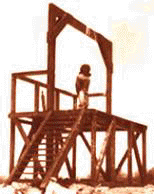
It would be naïve to suppose that France was motivated by compassion
for the Armenians and their tragic past when it voted, last January,
to describe the killing of the Armenians in 1915 as genocide. As the
Turks say often enough, France should first recognise that it has itself
been guilty of genocide or crimes against humanity in Algeria. But questionable
French motives should not be a reason for yet another cover-up of what
the ruling Ottoman party did to the Armenians in 1915-1917.
Many of the Turkish criticisms of France aimed to obscure the facts, rather than dispute a false charge. A Turkish paper published these words of anger: "Let it be clear to world public opinion: in the past we punished all the infamous half-castes who, not content with profiting from our lands, attacked our possessions, the lives and honour of the Turks. We know that our forefathers were right and, if there were such threats again today, we would not hesitate to do what was necessary" (1). This angry outburst is not exceptional: works regarded as scientific use similar expressions.
Why does the word genocide provoke such rage in Turkey? The Turks could, after all, simply recognise that the massacres occurred but say they were not responsible for them. The founder of modern Turkey, Mustafa Kemal Ataturk, spoke on the subject dozens of times; he condemned the massacres, which he called infamous, and demanded that those who were guilty be punished. The leaders of the then ruling Ottoman party, Ittihad ve Terakki (Union and Progress) (2), who organised the killings were tried in 1926, although they were indicted for different crimes. Several of them were executed. So Turkey could simply express regret for the crimes against the Armenians and explain they had been committed by the Ottoman state, not the new Turkish republic.
In search of identity
One the main obstacles to a public debate is a collective amnesia: the loss of Turkey's communally shared memory results from the deadening of the Turks' historical awareness over several decades. Ataturk severed the lines connecting people to their past. Every nation-state, at the moment of its creation, looks for historical roots on which to found its legitimacy. If it doesn't find them, it invents them. As French historian Ernest Renan noted, "Forgetting and even historical mistakes are essential factors in creating a nation" (3). The founder of the young Turkish republic scrupulously obeyed this rule.
The Turks faced a specific difficulty: over the centuries of Ottoman rule, Islam had gradually effaced everything to do with Turkish identity from the collective memory. The Turks had to go back to the pre-Ottoman period to discover their missing identity and roots - passing over 600 years of history in silence.
Through a series of reforms, such as the westernisation of dress codes, they tried to erase the traces of a recent past that had become undesirable and, with the adoption of the Latin alphabet in 1928, more or less inaccessible to the younger generation. The collective memory was thus emptied of much of its content. It was replaced by an official history written by a few authorised academics, which became the sole recognised reference. Events prior to 1928 and the writings of past generations became a closed book. The notion of the past was rendered evanescent, and the limits of memory and historical awareness reduced to no more than people's own personal experience and that of their closest environment. In these circumstances, how can ordinary Turks be expected to take the initiative and open a debate on their own history ?
In addition to the absence of historical awareness, there is another, greater reason for the Turks' behaviour: their history is composed of a series of traumatic shocks. Between 1878 and 1918 the Ottoman rulers lost 85% of their lands and 75% of the population of their empire. In its final century, the empire steadily disintegrated: a series of heavy military defeats, interspersed with the occasional victory, led to unfavourable armistices under pressure from the Great Powers. This period of uninterrupted wars, which killed tens of thousands, was, for the Turks, an era of dishonour and humiliation.
The Ottoman elite, crushed by the weight of a glorious past and suffering from a loss of self-esteem, saw the first world war as a historic opportunity to regain its former grandeur and recover its national pride. That illusion fast vanished. In the atmosphere of resentment that followed, the genocide seems to have been revenge against those seen as responsible for this situation. The Armenians became substitute enemies for the Great Powers and, by implication, the Christian peoples of the empire.
The Ottoman leaders used the Armenians to settle scores they could not settle elsewhere. That is why they insisted on presenting the new republic as a renaissance - or even an absolute beginning. Their leaders did not just purge this period of trauma by rewriting history and refashioning a new national identity. They also managed to blot out its memory and stifle any initiative that could impinge on this organised amnesia. This explains the susceptibility towards anything that touches on the Armenian question. The Turks have not yet been able to construct an identity purged of the old trauma.
The republic implicated
Links between the founding of the republic and the Armenian massacres have also done much to make the subject taboo. Leading figures connected to the republic have spoken publicly on the issue. A well-known member of the Ittihad ve Terakki party, Halil Mentese, said: "If we had not cleansed eastern Anatolia of the Armenian militia who collaborated with the Russians, the founding of our national republic would not have been possible" (4). At the republic's first National Assembly, speeches were made on the themes of: "We took the risk of being thought of as murderers to save the fatherland". Another assembly member said: "As you know, the question of the deportation was an event that provoked the reaction of the whole world and made us all seem like murderers. We knew, before we launched this action, that we would be subjected to the anger and hatred of the Christian world. Why did we allow our name to be mixed up with the opprobrium of a reputation of murderers? Why did we take on such a huge and difficult task? Because we had to do what was necessary to preserve the throne and future of our country, which in our eyes are more precious and sacred than our own lives."
With time, these words affirming with some courage that the republic had been founded on genocide were superseded by official history: anti-imperialism and respect for the Kuvay-i Milliye forces (the first resistance troops during the war of national independence) became the indispensable components of national identity. So the Kuvay-i Milliye spirit became a symbol of anti-imperialist identity for all the young generation of revolutionaries in Turkey in the 1960s.
Fear of seeing these certainties crumble is an important reason for the Turkey's refusal to debate the Armenian question. There would be a danger of destroying the usual models of representation used to explain Turkey and the world. A debate on the genocide would end up by showing that the state was not the product of an essentially anti-imperialist struggle, but rather of a war conducted against the Greek and Armenian minorities. It would also become clear that a significant number of the Kuvay-i Milliye soldiers, held up as heroes, had either directly taken part in the genocide or had profited from looting the Armenians.
Before the end of the first world war, plans for a retreat in Anatolia and for organising a national resistance had already been worked out in case of defeat. In 1918 these plans were put into action. The organisations behind the national resistance movement such as Mudafaa-i Hukuk (Society for the Defence of Rights) or Reddi Ilhak (Refusal of Division) were founded, either on the express orders of Talat Pasha, minister of interior from 1913-1917, or of Enver Pasha, minister of defence during the same period, or on the orders of the Commissariat (5) which they headed. These organisations were set up in particular in regions where there was a possible Greek or Armenian threat.
After the capitulation treaty signed with the British on 30 October 1918 in Mundros, Greece, the first five resistance committees were organised against the minorities: three against the Armenians and the other two against the Greeks. Their founders were members of the Ittihad ve Terakki party, some of whose officials were wanted by the British for having taken part in the genocide. The commissariat, among other tasks, had to hide them and find them shelter in Anatolia. It thus became a symbol of the interweaving of the genocide of the Armenians and the resistance in Anatolia.
Afraid of revenge
There was a second link between the emergent republic and the genocide. It came from the emergence of a class enriched as a result of the genocide, which came to constitute one of the social bases of the national movement. The leading families, or "notables", who had prospered from the looting, feared that the Armenians would return to take back their possessions and take revenge. That is what happened, in fact, in the Cukurova region, where the surviving Armenians returned with the occupation forces to take back what belonged to them. So the notables fell in with the national liberation movement, and even organised it in some places. Some of them were close to Mustafa Kemal himself: for example Topal Osman who later became commander of his personal guard. Measures passed by the old Constantinople (Istanbul) government on 8 January 1920 for the restitution of Armenian possessions were cancelled on 14 September 1922. The new government in Ankara (which became Turkey's capital in October 1923) realised the need to look after the interests of those who had contributed to the founding of the state.
There is also a third link between the genocide and the republic: some of the organisers and top officials of the first Kuvay-i Milliye brigades in the regions of the Marmara, Aegean and Black Seas were wanted for taking part in the massacres. In organising the resistance movement, Mustafa Kemal had been actively helped by members of the Ittihad ve Terakki party wanted for crimes against the Armenians. They were later given the highest positions.
Sukru Kaya, minister of the interior and secretary general of the People's Republican Party (Cumhuriyet Halk Partisi, CHP) founded by Mustafa Kemal, was in charge of settling immigrant and nomadic populations at the time of the "deportation". This position made him officially responsible for organising the deportation. The German consuls present recorded Sukru Kaya's words: "We must exterminate the Armenian race".
Mustafa Abdulhalik Renda was prefect of Bitlis, then of Aleppo, during the massacres. The German consul Rössler describes him as someone "relentlessly taken up with the destruction of Armenians". Vehip Pasha, commander of the 3rd army, explained in the account he wrote in 1919 how, during the war (after February 1916) Renda had had thousands of men burned alive in the region of Mus. He later became a minister and president of the National Assembly.
Arif Fevzi, detained in Malta (prisoner number 2743) for having directly organised the Diyarbekir massacres, became a minister from 1922 to 1923. Ali Cenani Bey (prisoner number 2805), who profited materially from the genocide, was minister of trade from 1924 to 1926. Trustu Aras, a member of the sanitary commission in charge of burying Armenians who had been killed, later held high positions in Ankara: he was foreign minister from 1925 to 1938.
Thus Mustafa Kemal used people from the Ittihad ve Terakki party wanted for crimes against the Armenians and Greeks, as well as notables who joined the resistance for fear of revenge by these two minorities, to conduct the war of national independence. For the wanted party members, in particular those from the Special Organisation which actually committed the massacres, joining the war of independence was a matter of survival. Their choice was between surrendering and receiving heavy sentences, even execution, or joining and organising the resistance. Falih Rifki Atay, a close friend of Mustafa Kemal, summed up the situation: "When, at the end of the war, the British and their allies decided to ask for explanations from Ittihad ve Terakki party officials for the massacre of the Armenians, all those who could be in trouble took up arms and joined the resistance" (6).
All this makes it easier to understand why the genocide became a taboo subject. Admitting that there were thieves and murderers among those heroes who saved the country would, most certainly, have had a shattering effect. Negation is an easier path for those who fear shaking the Turks' belief in the republic and national identity. But there is a third option: in the name of democratic values, the country could distance itself from its past.
* Turkish historian and sociologist, author of Dialogue
across an International Divide: Essays towards a Turkish-Armenian Dialogue,
The Zoryan Institute of Canada, Toronto, 2001.
(1) See Akit, Istanbul, 12 February 2001.
(2) Part of the Young Turks movement, founded in 1908.
(3) Ernest Renan (1823-1892), "Qu'est-ce qu'une nation?",
conference at the Sorbonne, Paris, 11 March 1882.
(4) Statement reported by historian Yusuf Hikmet Bayur, Turk Inkilabi
Tarihi (History of the Turkish revolution), vol II, chapter IV, Turkish
Institute of History, Ankara, 1988.
(5) The job of the commissariat was to organise the resistance and help
those wanted for murder of the Armenians to escape.
(6) Falih Rifky Atay, Cankaya, Ataturkun Dogumundan Olumune Kadar (Cankaya,
From Ataturk's birth to his death), Istanbul, 1980. ![]()
4. - AP - "Turkey Nervously Awaits US Response":
ISTANBUL
Turkey's army stood at alert as NATO's only Muslim member worried
that U.S. military retaliation for this week's terrorist attacks could
target its neighbors and place further strain on its threadbare economy.
Turkey's armed forces could be involved in a NATO attack or its bases
could be used. An attack on Afghanistan - believed to harbor Osama bin
Laden, the chief suspect for Tuesday's attacks - ``wouldn't be much
of a problem for Turkey,'' wrote Sami Kohen, a commentator for Milliyet,
a daily newspaper.
But if Iraq turns out to have been involved in Tuesday's attacks - or if it is targeted for past actions - then Turkey's role could be crucial, forcing the government to answer awkward strategic questions. ``I suspect ... that in the corridors of the Foreign Ministry they were virtually praying yesterday that Baghdad isn't the target,'' columnist Fatih Cekirge wrote Friday in the daily newspaper Star. ``Because if Baghdad is the target for a NATO or U.S. attack, it could mean the destruction of the Baghdad administration, and a new map of Iraq.''
That would reopen an issue the Turkish government hoped was closed after the 1991 Persian Gulf War - the possibility of a Kurdish state in northern Iraq. Already local leaders in the north enjoy broad autonomy from Baghdad, and Washington has long seen the Kurds as central to any anti-Saddam coalition.
Turkey argued against a ground attack on Iraq during the
Gulf War, fearing that rebellious Kurds, perhaps with U.S. backing,
would seize the opportunity to establish an independent Kurdish state
in the north that would offer an example for Turkey's estimated 12 million
Kurds. Turkey fought a 15-year war against autonomy-seeking Kurdish
rebels that cost some 37,000 lives, and continues to bar Kurdish-language
broadcasting and education. No matter what happens militarily, Turkey's
battered economy is likely to suffer further blows. ![]()
5. - Kurdish Observer - "United Nations should organize a peace conference":
Denouncing the attacks in USA on behalf of 32 non-governmental organizations, Diyarbakir Democracy Platform called on the United Nations (UN) to organize a "Peace Conference" in order to eliminate violence.
DIYARBAKIR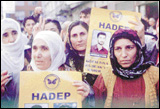
Denouncing the attacks in USA, Diyarbakir Democracy Platform called
on the United Nations (UN) to organize a global peace conference in
order to ensure peace and justice in the world and to eliminate all
social conditions of violence.
A press conference made by Diyarbakir Democracy Platform and held in IHD (Human Rights Association) Diyarbakir Branch was attended by representatives of 31 non-governmental organizations. Reading the statement, Spokesperson of the Platform Ali Oncu said that the violence in USA is unexplainable. Stating that they condemn the attacks, Once continued to say the following: "We understand the sorrows caused by violence which we know very well and experience the similar, and we offer our condolences." Emphasizing that they worry that humanity might be dragged to a new global war, Oncu added that the attack violated the right to live and even all human values.
"Everybody should calm down"
Oncu asked for everybody to ensure and preserve peace in the world, Oncu pointed out the following: "As the victims of this terrible attack seek justice, rights of all innocent people, religious people and communities should be respected at the highest degree. Those who made the attacks are those who have lost their humanity. We should not lose our humanity and human values."
Unite against war
Calling on all human rights institutions, non-governmental
organizations, political organizations and trade unions to create a
front against war and for peace in the world, Oncu had the following
to say: "The world should overcome the next days, week and months
with a big fortitude and tranquillity. A peace conference should be
held by United Nations as soon as possible." ![]()
6. - AFP - "Istanbul police clash with hunger strike supporters":
ANKARA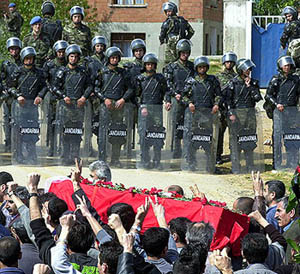
Police used tear gas and water cannon in clashes with supporters
of jail hunger strikers in Istanbul on Saturday, human rights activists
and witnesses told AFP. Some 30 people were detained and dozens injured
in the clash, which erupted when riot police moved in to disperse about
150 people taking part in the funeral of the latest victim, a woman
who died on Friday.
The hunger strike supporters were taking the body of 32-year-old Umus Sahingoz, who was the 34th person to die in the fasts, to a forensic institute, Mehmet Ali Inci from the Human Rights Association (IHD) said. Inci claimed the police moved in on the procession to avenge a suicide bombing that killed three people, two of them police officers, in addition to the bomber in the city on Monday.
Responsibility for the attack was claimed by the chief architect of the hunger strike, the far-left underground People's Liberation Party-Front (DHKP-C), which said it was staged in support of the fasts. The bombing also killed an Australian woman and injured some 20 police officers. The hunger strikes, which began last October, are being held to protest a decision to move political prisoners to new jails, where they are no longer able to see one another.
Saturday's incident broke out in the Kucuk Armutlu district, where 16 far-left activists have been fasting in three separate houses in solidarity with some 200 hunger-striking inmates. The woman who died on Friday was in one of the houses. One of the men who is tending for the hunger strikers said that police interrupted Sahingoz's funeral procession after the crowd began shouting far-left slogans. The police apparently deemed the event an illegal demonstration.
The protestors built several barricades in the vicinity and set some of them on fire, he said, while television footage showed demonstrators hurling sticks and stones at police. The security forces returned to the neighborhood several hours later as the protestors had rebuilt their barricades. The officers again used water cannon and tear gas against a group of hooded men guarding barricades in front of two neighboring houses, where all the strikers gathered following the initial clashes. Ambulances and firefighters were also deployed, Anatolia news agency said, while the NTV news channel showed an armored vehicle burning.
An activist inside one of the houses told AFP over the telephone that they would set themselves ablaze if police raided the buildings. "This will be our only response... Unfortunately, we do not have weapons," the unnamed man said. Following Monday's suicide bombing, Interior Minister Rustu Kazim Yucelen had warned of tough action against the hunger strikers. The protestors, backed by rights activists, say the new jails, where cells for up to three people replaced dormitories housing dozens, alienates inmates from fellow prisoners and leaves them more vulnerable to mistreatment.
But Ankara has ruled out a return to the dormitory system,
maintaining that the packed compounds were the main factor behind frequent
riots and hostage-taking incidents in its unruly jails. Several laws
aimed at improving prison conditions have failed to satisfy the strikers.
![]()